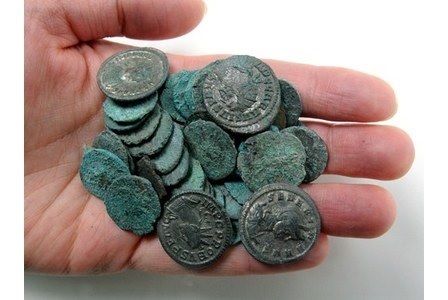Post by UKarchaeology on Jul 13, 2015 19:46:22 GMT

Archaeologists are celebrating the donation of a hoard of Roman coins – described as “ a hugely significant find” – to the new Museum of Somerset.
The 2,118 bronze coins, found by archaeologists excavating a site at Maundown, near Wiveliscombe, before Wessex Water built a new water treatment plant, may be evidence of financial crisis in Romano-British Somerset.
They were found in 2006 and have been donated to Somerset County Council by Wessex Water after a Treasure Inquest at Taunton last week heard that the British Museum disclaimed interest on behalf of the Crown.
Stephen Minnitt, Head of Museums, said: “The Maundown Hoard of coins is a hugely significant find because instead of being buried in an apparently isolated location, like many other hoards, it was positioned beneath the floor of a Roman timber building.
“The location may show that the hoard was meant to be retrieved at some time and implies burial as storage rather than any religious or other ritual purpose.
“The hoard was buried in about AD 298, just a few years after the recently discovered Frome hoard.
“It is possible that this was a time of financial crisis as many other hoards are of this period and perhaps people were saving rather than spending.
“The Roman building was near a smithing hearth and archaeologists found evidence of ironworking such as hammer scale and smithing slag, showing that this was a modest artisan settlement. The number of coins must have represented a considerably large sum to a working Roman period family.”
The work of cleaning and recording the coins has been carried out at the British Museum.
Wessex Water funded the excavation and donated the hoard along with other finds of pottery and artefacts such as a shale bracelet.
Councillor Christine Lawrence, Cabinet Member for Heritage, said: “We are delighted to accept this kind donation from Wessex Water into the Museum of Somerset, where they can be viewed and enjoyed by visitors for many years to come.
“This find again highlights Somerset’s rich heritage and shows how important it is to properly investigate archaeological remains disturbed by development.”
Rachel Cawte, Wessex Water’s Engineering and Construction Environmental Manager, said: “We recognise the importance of appropriate archaeological investigations for all our major construction schemes.
“In this case we were pleased to help shed some light on how our ancestors lived in this part of Somerset 2,000 years ago.
“The archaeologists gathered a wealth of information during their four weeks at the site in 2006 and the haul of coins was a very exciting find for all of us involved in the project.”
The Museum of Somerset, which is located in Taunton Castle, is free to enter and is open from 10am to 5pm, Tuesday to Saturday and on Bank Holiday Mondays. It opened to the public in September following a £6.93m redevelopment.
(source: www.westerndailypress.co.uk/Bronze-coins-Somerset-reveal-Roman-age-austerity/story-14069240-detail/story.html )
